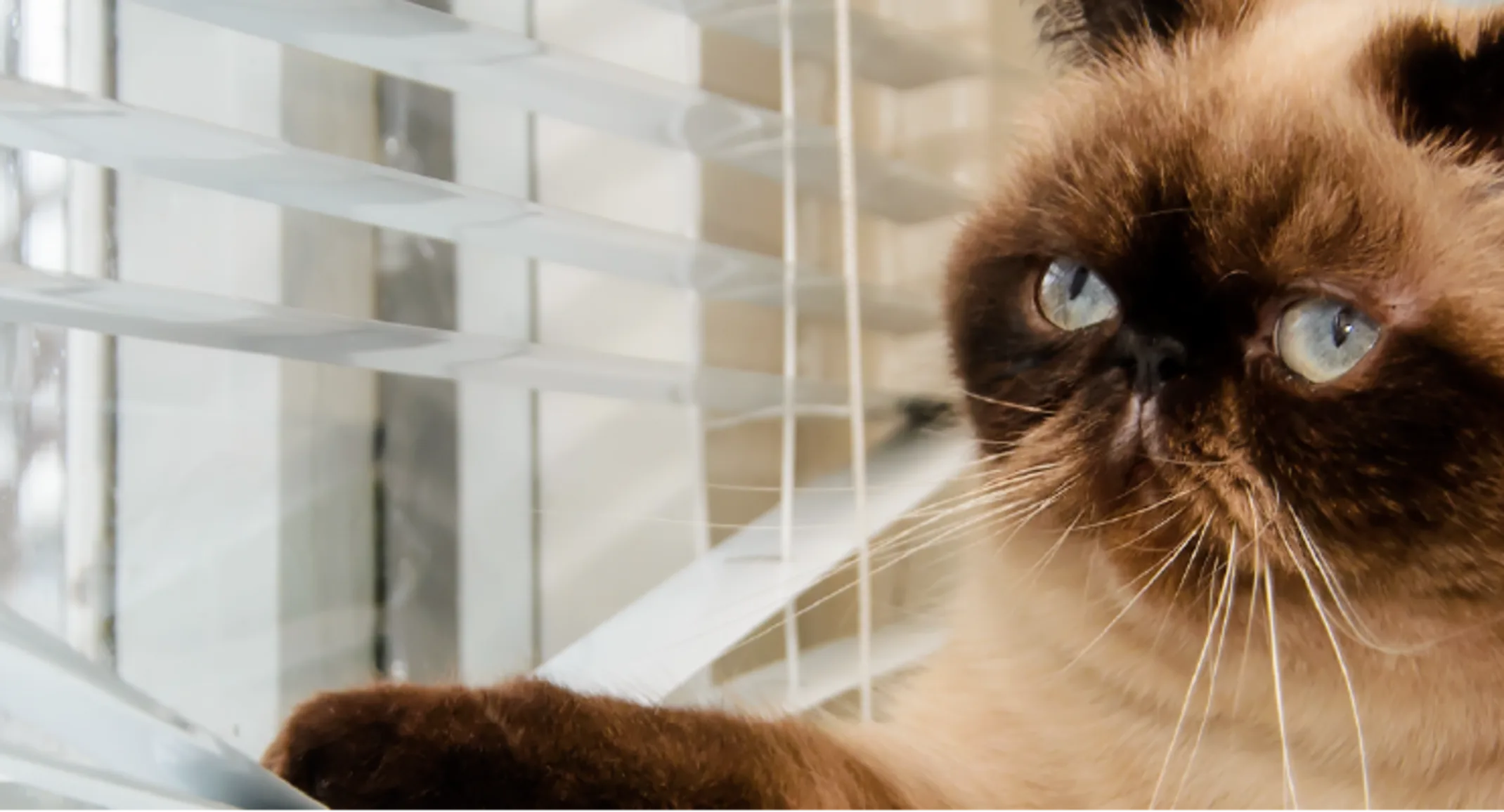Keeping Cats Indoors
General

In a former article, I discussed pet obesity. This week I’m tackling a topic narrower in scope, but no less significant to the overall health of cats. I love cats more than cats love me. In fact, I love cats more than cats love anyone. To me, the most appealing thing about cats is that it’s their world, and as long as we provide food and a warm body to lie on, they’ll allow us to stay. I’ve always had cats, and no one will ever make the argument that when I was growing up we were the most informed and responsible cat owners. Cats in our household seemed to come and go at an alarming rate. I didn’t realize that their early demise was avoidable until I got older and wiser.
A World of Dangers
If your cat spends any part of its days or nights outside, unsupervised, it faces a world of dangers; it’s a scary place fraught with hazards that always seem to find cats and as often as not, will kill them. A cat kept indoors, however, avoids these dangers and leads a pampered, safe and secure life. Here’s the short list of hazards your cat will face outdoors:
Parasites Outdoor cats eat weird stuff. Their instinctual desire to kill and eat things like mice, snails, and lizards exposes them to parasites as a part of those parasites’ normal life cycle. The parasites they can contract from exposure to wild animal feces can cause severe gastrointestinal disease, anemia, liver disease, and kidney failure. Some of these diseases can be fatal, others difficult and costly to diagnose and treat. Fleas and ticks are the bane of free roaming cats. It is challenging to completely protect a cat that is constantly exposed to fleas from feral cats, raccoons and opossums, even with the best preventatives like Frontline Plus. (And, if you think about it, those parasites are brought into your home and can affect you as well.) In South Florida, heartworm disease is a very real concern for cats although most people think it only affects dogs. There is no effective treatment for cats with feline heartworm disease: the number one clinical sign of heartworm disease in cats is acute death.
Cars A cat sleeping on your couch will never be hit by a car. Period.
Predators I regularly see cats that have been attacked, injured, or killed by dogs, coyotes, or other cats more dangerous than your pampered, declawed house pet. Your cat may not go looking for trouble, but trouble will find it eventually, and the injuries can be devastating. An established population of feral cats has a distinct pecking order; if your cat enters their world, it enters at the very bottom of that pecking order.
Disease A tremendous percentage of feral cats carry FeLV, FIV, and FIP. Without going into too much detail, these are all incurable viral diseases that can ultimately kill your pet.
Your cat will also carry these diseases home and expose your other cats before any symptoms appear. Of the three listed, only FeLV has an effective vaccine available. Although rabies is uncommon in cats, cases have recently been reported, and rabies is contagious to humans. Make sure your cat is kept current on its rabies vaccinations. You should also know that a cat that spends time on a ground floor screened porch or lanai is NOT an indoor cat. Cats spitting and hissing at each other through a screen will transmit disease. The screen may keep out mosquitoes but it won’t stop a microscopic virus. We see many cats contracting respiratory disease this way.
Cats are easy to poison because they will lick anything off their fur, no matter how noxious.
Terrible Humans Sad as it may be, there are awful people out there who will think nothing of poisoning or shooting your cat. Cats are easy to poison because they will lick anything off their fur, no matter how noxious, and the resultant kidney or liver failure will often kill them. When I was a senior vet student, Animal Control brought in a cat that had been shot through the head with an arrow. Miraculously, the arrow entered his face just below his eye, passed over the roof of his mouth, and exited just below his jaw without hitting any vital structures. We cut off the arrow, pulled it out, and the cat made a complete recovery. In fact, a photo of the cat with an arrow stuck through his head being carried into the hospital by the Animal Control officer made it into the newspaper, and we were deluged with phone calls from people wanting to adopt him. The news is full of stories of animals tortured by humans with endings generally much less happy than my story.
Animal Control If your cat is out roaming around and someone calls Animal Control, it can be picked up. Someone may find your cat and turn it in to the Humane Society or Animal Control because they believe it is lost. Without a microchip (a very quick, inexpensive, painless, and effective way of locating you as the owner) your cat may be adopted or euthanized. Someone may decide just to keep your gorgeous cat because it is cute and friendly.
When I was a kid, we lost cats to many of the dangers listed above. They could all have been avoided and, looking back, I wish we had made better choices and kept them indoors. They really don’t need to go outside, even if they seem to want to explore the great outdoors. I know litter boxes are gross and inconvenient, but aren’t they a small price to pay for keeping your cat alive and healthy?
~ Dr. Randy Eisel
